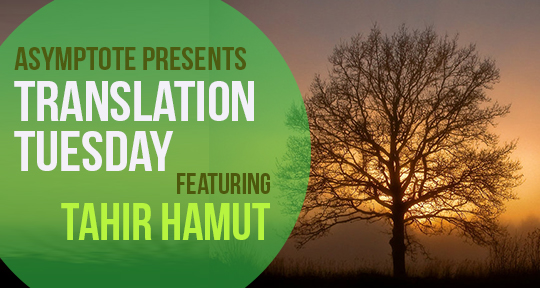Tahir Hamut grew up in Kashgar, an ancient city in the southwest corner of China’s Xinjiang Uyghur Autonomous Region. The city of Kashgar—its fierce local pride, its layout, its customs, and its slang—has been a persistent theme in his three decades of poetic work. The three poems included here, though, were written in the three other cities of Tahir Hamut’s life, each of them a capital city: Beijing, where he completed college and worked for several years as a young man; Ürümchi, Xinjiang’s capital, where he worked as a film director for nearly two decades; and Washington, DC, where he moved with his family last year amidst deteriorating conditions in Xinjiang.
While the young poet of “Her” (1993) speaks of aging and darkness, his tone is relaxed and relatively light. The poem’s unadorned style and syntax are typical of Tahir’s work from his Beijing period. More than two decades later, “Body” (2016, Ürümchi) and “What Is It” (2017, Washington) are more complex on both a stylistic and an emotional level; more troubled, too, with an insistent sense of motion. If “Her” is a moment in a young man’s private life, the two later poems are the collision of private life with forces beyond an individual’s power to control. In “Body” and “What Is It,” Kashgar and the world of Tahir’s youth are distant in time and space; but that deeply felt distance shapes the world of these poems.
—Joshua L. Freeman
Her
She walks along. She stops for a moment.
Like a small burning tree.
I am busy, I am tired and worn out.
The tree’s shade sinks into my body’s aged places
and
opens into a flower.
It’s the end of the month now.
I’m hungry. I eat an apple while writing a poem.
I can see
phonetic symbols raised ever so slightly.
I peel off the darkness
and am at peace.
But
in my thoughts she is right before me, walking along.
May 1993, Beijing
Body
After exile water
after stray gatherings
after utter collision
after strange embraces
after bonding like ice
after infinite grinding
after silently rolling
after all the damn polishing
and
after fruitless forgettings
in the end
the grains of sand turned to stone
August 2016, Ürümchi
What Is It
What is it
from far away, from behind the domed water,
that stayed with me, that came along with me?
A weak vow written in the yellowing fog,
audacity standing at an angle
or
the layered dimness passed from hand to hand?
These days
are crowded with shattered horizons,
shattered!
In the runaway season
when surrender hides deep in the suitcase
when noble doubts run over the weight limit
when dead ends continue onward
when the exodus stalls at the second floor
what is it
that keeps you from seeing I am still alive?
So simple are my inner soul and outer face,
oh dark-eyed one,
a tree that reddens from within
turns to stone beside me
A spray of sweet-smelling camel grass
grows quickly, blooms open
at the doorstep of the past
7 November 2017, Washington, D.C.
Translated from the Uyghur by Joshua L. Freeman
Tahir Hamut was born in 1969 in a small town near Kashgar, in China’s Xinjiang Uyghur Autonomous Region. His first poem was published in 1986, and in the last three decades he has become one of the foremost modernist poets writing in Uyghur. From the late nineties he worked as a film director in Xinjiang’s capital, Ürümchi, where he also founded his own production company, Izgil. He currently lives in Washington, DC with his wife and two daughters. His work has previously appeared in English translation in Words Without Borders, Asymptote, Crazyhorse, Gulf Coast, Berkeley Poetry Review, and elsewhere.
Joshua L. Freeman is a PhD candidate at Harvard University, where his upcoming dissertation focuses on official culture and nation formation in twentieth-century Chinese Central Asia. His translations of contemporary Uyghur poetry have appeared in Crazyhorse, Asymptote, Words Without Borders, Hayden’s Ferry Review, Berkeley Poetry Review, and elsewhere. More of his translations can be found at his website.
*****
Read more from the blog:

